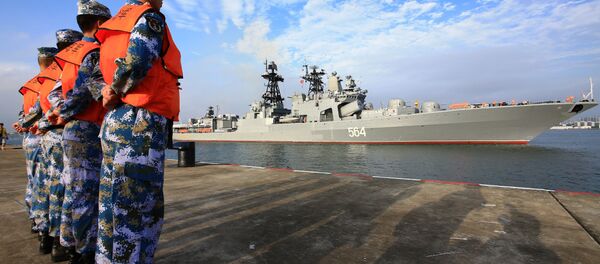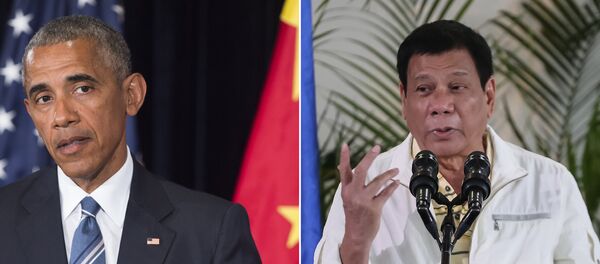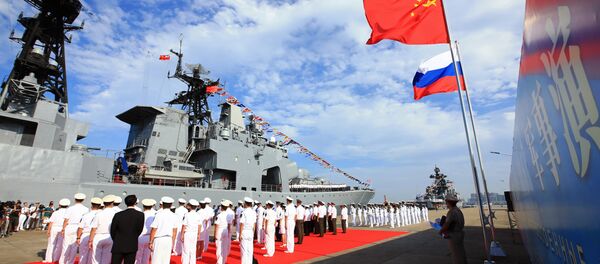It is hardly a coincidence that the US has intensified its FONOP (freedom of navigation operation) maneuvers in the South China Sea at the same time trying to drive a wedge between Beijing and the ASEAN nations.
Furthermore, on July 12, 2016 The Hague Permanent Court of Arbitration (PCA) issued a ruling on the dispute brought by the Philippines — the US' military ally since 1951 — against China over the South China Sea back in 2013. The Court stipulated that China's historic claims within the nine-dash line in the South China Sea have no legal foundation.
In March 2016 Militarytimes.com highlighted that the agreement between Washington and Manila had come into force, paving the way for a new American "permanent military presence" across five bases in the Philippines and targeting "the contested South China Sea."
It seemed that Barack Obama's "Pivot to Asia" strategy reached its goal.
However, further developments showed that there's many a slip between the cup and the lip.
Following The Hague ruling ASEAN nations refused to aggravate tensions with China, while the Philippines' new leader Rodrigo Duterte didn't rush to reap the benefits of the award.

Why Obama's 'Pivot to Asia' Strategy Has Been Proven Ineffective
As Obama's second term is ending, can we say that his Pivot to Asia strategy has failed?
"Without a scintilla of doubt!" Mathew Maavak, geostrategic analyst and doctoral candidate in Security Foresight at Universiti Teknologi Malaysia (UTM) told Sputnik.
"Washington virtually sent an armada to rebuff so-called Chinese aggression in the South China Sea, and expected the Philippines to be its military pivot in Southeast Asia. Instead, President Rodrigo Duterte called his American counterpart a 'son of a b***' and is now requesting the exit of US Special Forces from the southern Philippines," he noted.
"I will be charting a [new] course [for the Philippines] on its own and will not be dependent on the United States," Duterte stressed after elections, as quoted by Reuters.
Furthermore, the new Philippines President announced recently that he is mulling purchasing arms from China and Russia and may end joint patrol with the US in the South China Sea, prompting experts to speculate about a "dramatic shift in the geostrategic picture of the region," as Bloomberg noted.
"Generally, US efforts in this area [the South China Sea region] have not been successful. It is trying hard to cultivate special ties with Vietnam — using the South China Sea card — but Hanoi is hedging its cards well by engaging Moscow and New Delhi as well," Maavak pointed out.
"The US may have lost the plot — and the pivot — but does it still possess the capability to destabilize Southeast Asia? That's the worrying question…" he remarked.

South China Sea May Become 'Non-Issue' if Trump Wins
The question remains open whether or not Obama's successor will follow in his footsteps in Southeast Asia.
Tom McGregor, Commentator and Editor at CNTV (China Network Television), believes that if Republican presidential candidate Donald Trump wins the US presidential election in November, Washington may reconsider its strategy toward Beijing and Moscow.
"Now that Trump seems more likely to become the next US president, the South China Sea may become, at least relative to today, a non-issue. Trump is more concerned about promoting fair trade and bringing jobs back to the United States and costly territorial disputes do not play into that equation," McGregor told Sputnik.
"The US Pivot to Asia has forced China to pursue its own reset with Russia. We can expect closer ties between Beijing and Moscow in the days ahead so long as Washington seeks to restrain China. Nevertheless, if US reverses course during a Trump presidency, I anticipate improved bilateral ties between Russian and the US while China may face more challenges due to a Putin-Trump rapprochement," McGregor suggested.
Meanwhile, Beijing and Moscow are bolstering the Sino-Russian cooperation. At the recent G20 Summit Beijing demonstrated "special hospitality" toward Russian President Vladimir Putin.
Why is Beijing interested in further political, economic and military rapprochement with Russia? Is it somehow connected with the US pressuring Beijing in the South China Sea?
"Again, one can speculate that this gesture was indicative of larger, regional autarkic forces at work behind the scenes. It is not just the South China Sea at stake here. The world is waking up to the likelihood of a post-American multipolar world. This will be a post-dollar world as well, and it will be anchored foremost in Greater Eurasia. Only WWIII can delay — not prevent — a shift of geopolitical and geo-economic power to the East," Maavak emphasized, speaking to Sputnik.




